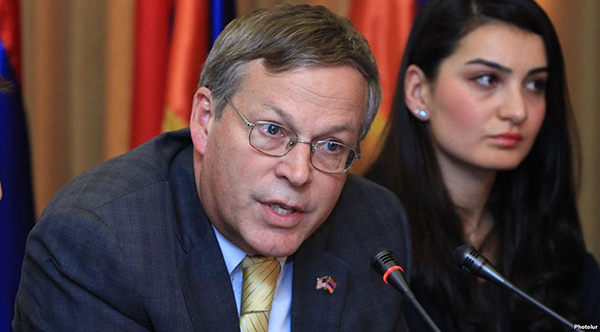By Hambersom Aghbashian
Nuray Mert (born in 1960 in Trabzon, Turkey) is a Turkish journalist and political scientist. She is a columnist for Hurriyet Daily News. After graduating from Fevziye Mektepleri Işık College, she studied political science and history at Boğaziçi University, Istanbul, where she obtained the master’s degree on a thesis entitled “Prens Sabahaddin ve Terakki Mecmuası”, “Prens Sabahaddin and Terakki Magazine”, and the doctorate on a thesis entitled “Erken Cumhuriyet Döneminde Laik Düşünce”, “Secular Thought in the Early Republican Period”. She worked for some time as a research assistant at Boğaziçi University, after which she became lecturer at the Department of Economics of Istanbul University. In 2012-3 she was an International Scholar in Residence at the Stanford Humanities Center. She used to host a TV show, but this was dropped after Turkish Prime Minister Recep Tayyip Erdoğan publicly criticized her, and she was also fired on February 19, 2012 from her job as a columnist for the daily newspaper Milliyet for the same reason. Mert has said that she now fears for her personal safety and the Turkish Journalists’ Association has denounced the attacks on Nuray Mert by Recep Tayyip Erdoğan.
According to a post on March 26, 2013 by “exeterhumanrightsupdate”, cases of journalists being fired for criticizing the government are a recurrent problem in Turkey. In 2012, Nuray Mert, a journalist from the Milliyet newspaper, was fired after being publically criticized by the Prime Minister for her articles.” (1)
In her article “ Turkey, Syria and Armenians in context” (Hurriyet Daily News – April 07,2014), Nuray Mert wrote: “Now, the Turkish government is complaining about the campaigns of the Armenian Diaspora, who have started to accuse Turkey of supporting ISIL (who crossed the border and attacked Kasab), and Armenians who lived on their way in Kasab had to flee to Latakia and Beirut. In the eyes of the Armenians, it has become a symbolic act against them, since it reminds them of the tragedy that befell Armenians who had to flee Turkey because of the deportations and massacres during WWI”. She added “Turkish Foreign Minister Ahmet Davutoğlu said “Turkey conveyed to the Armenian community and to the UN its willingness to help in the evacuation of Armenians in Kasab.” Well, but one first has to answer this question; “Why evacuate Armenians from Kasab?” There are many other questions which should follow: Why do they want to flee to Latakia or Beirut? Why are the Christians of the Middle East the first victims of the changing Middle East.(2)
Nuray Mert wrote an article in Hurriyet Daily News – April/20/2015, here are some abstracts: “The pope’s use of the G-word and then the European Parliament’s vote to urge Turkey to recognize the “Armenian Genocide” angered not only the president and the government, but also the nationalist opposition and a majority of Turks. Although we leftist/democrat intellectuals are inclined to recognize the Armenian massacre as a “genocide,” and many of us have been using the G-word for some time, we should admit that the nationalists of Turkey have a point. The point is that international condemnations of genocides are indeed politically motivated in most of the cases. On one hand, these objections should be taken into consideration. On the other, however, minor powers like Turkey never seem to comprehend the importance of self-criticism concerning their past; that is why they miss all chances to acknowledge their share of responsibility in the terrible events and moments of human history. Turkey and the Armenian massacre is one of the best examples. Turkey’s denial of genocide or of even the true extent of the Armenian massacres is always based on the accusation of treason – that Ottoman Armenians sided with the imperial powers, implying that they deserved what they got. Nevertheless, Turks never think that, in the end, Ottomans allied with other (German) imperialists in World War I to save their own empire. Besides, Turkey does not want to admit that it was not only the Armenians who revolted and/or joined the Russian army, but the whole civil (Armenian) population suffered from deportations and massacres. By the way, the Arabs also allied with the “imperialists” and staged the Arab revolt against the Ottomans, but Turks never considered collectively punishing their Arab co-religionists (Thank God). (3)
In her article ‘Still here, still bleeding’, Hurriyet Daily News- April 27, 2015, Nuray Mert mentioned, “I happened to be in Beirut last week. It was a good chance to catch up with Lebanese and regional politics and see friends. Besides, I could follow the Armenian Genocide commemoration.” She added, “Beirut is home to a considerable Armenian population and most of them are the grandchildren of those who took refuge in Lebanon after fleeing Turkey in 1915. Besides, many Christians and Muslims recognize the Armenian Genocide, so the commemoration march was very crowded this year, which is the centenary of that terrible event. Moreover, the minister of education declared April 24 a national holiday for schools. The title of a serial of cultural events to commemorate the genocide in Beirut was, “Still here, still bleeding.” Despite the bad omens, I need to hope the past tragedies of not only Armenians but also of Lebanon in general will not be here anymore, and will not bleed anymore.” (4)
_________________________________________________
1- http://exeterhumanrightsupdate.wordpress.com/tag/turkey/
2- http://www.hurriyetdailynews.com/turkey-syria-and-armenians-in context. aspx?
3- http://www.hurriyetdailynews.com/to-use-or-not-use-the-g-word.aspx?pageID=449&n
4- http://www.qoshe.com/hurriyet-daily-news/nuray-mert/still-here-still-bleeding/289998










